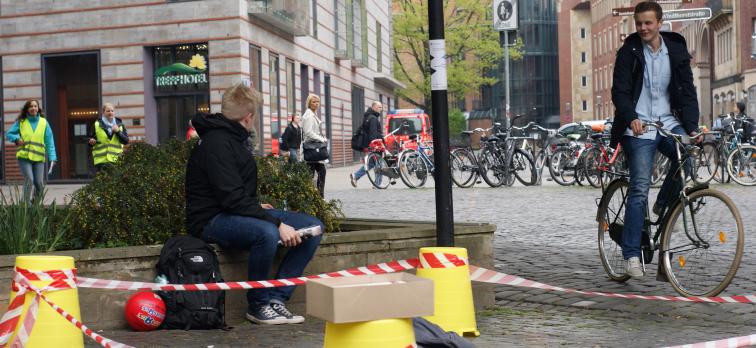
-
Quantitative Methods and Simulation in Humanitarian Logistics (Winter Term 2022/2023)
This course delves into the realm of decision models and simulation within Humanitarian Logistics (HumLog). Its primary goal is to define and specify decision and optimization problems within this field. Participants will explore decision support systems, evaluate existing approaches, and engage in discussions centered on potential enhancements.
The course covers mathematical optimization models and a range of decision support systems, starting from classical concepts and progressing into dynamic and stochastic decision models. Fundamental aspects of Humanitarian Logistics form the foundational knowledge base for this exploration.
One of the most popular courses, Quantitative Methods and Simulation in Humanitarian Logistics has been offered numerous times over the past decade!
Past Offerings:
Summer Term: (2020, 2019, 2018, 2017, 2014)
Winter Term: (2017/2018, 2016/2017) -
Enterprise Architecture Management for Blood Supply Chains (Winter Term 2020/21)
In this seminar, we delve into the critical domain of managing the intricate pathways of the blood supply chain. Blood, a lifeline in healthcare, holds paramount importance, and understanding its supply chain intricacies is pivotal.
Throughout our exploration, you’ll find out the importance of an efficient blood supply chain and unveil the potential consequences of interruptions, whether they stem from stock-outs, sudden demand spikes, or unforeseen disruptions.
The main objective of this seminar is to equip you with the tools and insights needed to design a robust information system architecture tailored specifically for blood supply chains. By combining theoretical understanding with practical applications, this course aims to empower you in crafting resilient systems capable of managing and optimizing these crucial lifelines within the healthcare ecosystem.
-
External Lecture for the NOHA Joint Master's Programme at the Ruhr University Bochum: Logistics in Humanitarian Action (Feb 2020 & Feb 2019)
There is little doubt that humanitarian logistics and supply chain management is key to the professional delivery of humanitarian action. This course will introduce different aspects of humanitarian supply chain management (SCM) and logistics, including chain components, procurement and warehousing, the social dimensions of delivery systems, logistics outsourcing, and performance management. Innovation and Cooperation with the commercial sector, both core topics of the 2016 World Humanitarian Summit, will be covered as well. To facilitate active learning with practical experiences the students will work on case studies, simulations and joint poster/powerpoint presentations.
Supply Chain Management:
The class will start with the wood-game simulation and its analysis. This will lead to a more theoretical introduction of SCM and logistics, which will be followed by a case study and additional reading on day two. Day one will thus be used to build the conceptual introduction into SCM. On the following days, presentations and exercises will cover the introduction of humanitarian logistics with focus topics in the area of humanitarian network design, logistics modelling, performance management and information systems in humanitarian logistics. The course will also include a study-trip to Münster and end with a small final paper.
Simulation Exercise 1: The Wood Game and the Bullwhip Effect
Duration: Full day
Simulation Exercise 2: Disaster Response Model
Duration: 180 min
Simulation Exercise 3: Inside Disaster Haiti
Duration: 90 min
Field Work: Rapid Needs Assessment
Duration: Half day
-
Improving Blood Supply Chains (Winter Term 2019/2020)
This course aims at revolutionizing the way we approach healthcare logistics. Our focus is on not just understanding the characteristics and challenges inherent in blood supply chains but also actively devising solutions and implementing transformative strategies.
This course stands as a cornerstone in the design and development of a simulation environment tailored explicitly for blood supply chains. We'll immerse ourselves in situation mapping and modeling, collaborating closely with project partners, and employing Enterprise Architecture Management (EAM) methods to ensure a comprehensive understanding of the landscape.
A significant highlight will be the application, adjustment, and extension of the HumLogSUITE simulation environment, leveraging the versatile capabilities of Analogic. Through hands-on exercises, we'll explore the intricacies of this platform, customizing it to suit the specific needs of blood supply chains in the African context.
-
Joint Seminar with the University of Washington, HCDE/CoSSaR, on "Information Systems in Crisis Management: Trends and Challenges" (Winter Term 2018/19)
The scale and pace of crises pose enormous challenges for the Crisis Management (CM) sector, with new threats emerging all the time. CM Innovation is therefore critical, but will only be successful if it is relevant and accessible to practitioners and operators.
Main objectives of the seminar: Understanding the international CM system(s), exploring current challenges and improvement potentials as well analysis of promising information systems trends in the application domain …in an international and multidisciplinary context with lecturers and students from the Human Centered Design & Engineering Department at the University of Washington.
-
Simulation of Humanitarian Supply Chains (Winter Term 2017/18)
QISPOS Information -
Evaluation of Quantitative Methods in Humanitarian Logistics (Summer Term 2016)
QISPOS Information -
Human Centered Evaluation of Information System Design for the Red Cross Societies (Summer Term 2016)
QISPOS Information -
Model-driven Mobile Assessment and Crowdsourcing for Humanitarian Logistics (Winter Term 2015/16)
QISPOS Information -
Simulation of Humanitarian Logistics Processes (Winter Term 2014/15)
QISPOS Information -
Mobile Crisis Situation Assessment (Summer Term 2014)
QISPOS Information -
Global Disaster Alert and Coordination System Goes Mobile - GDACSmobile (Summer Term 2012)
QISPOS Information -
Modeling and Analysis of Humanitarian Logistics Processes (Winter Term 2010/11)
QISPOS Information

